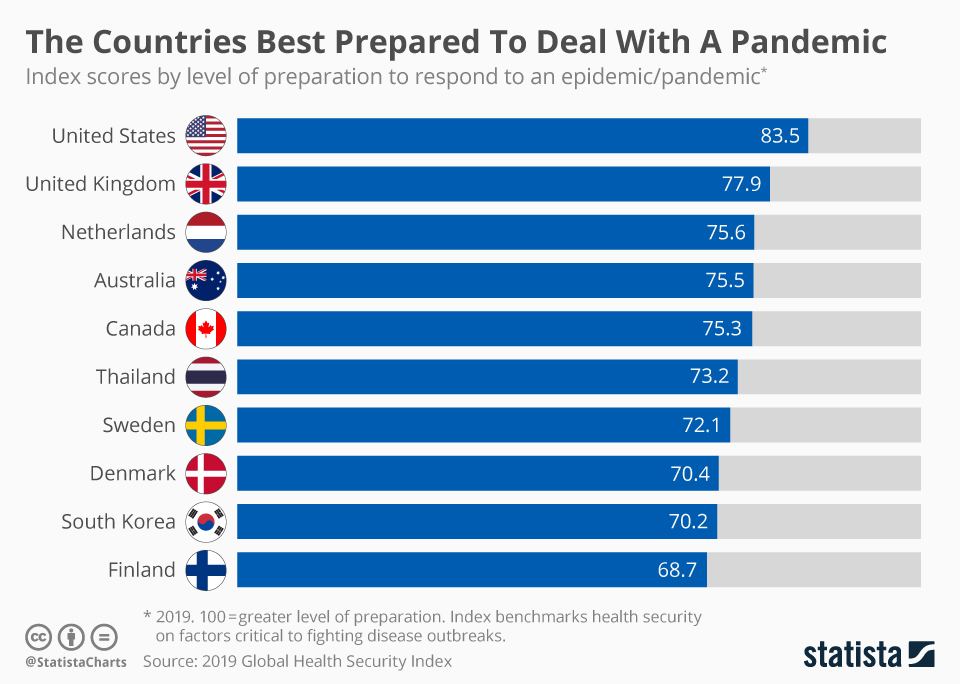The US was named the best equipped country to deal with a pandemic not a year ago — what happened there?
31 Mar, 2020 17:51 / Updated 2 hours ago
Just last year, the US topped a list of the countries best equipped to deal with a pandemic. But the experts have egg on their face as America spirals into Covid-19 catastrophe. What went wrong?
It looks clear now that the US is going to be one of the countries worst affected by the coronavirus pandemic. Their stock market has gone into full blown meltdown, and is set for its worst quarter of all time. It seems inevitable that their economy will be plunged into a second Great Depression.
Soon they will overtake China’s number of deaths from Covid-19. Their figures now stand at almost 165,000 people infected, and having doubled in three days, the death toll has surpassed 3,000 people. President Trump has had to quickly recant his rhetoric about the lockdown being lifted and the country being put back to work by Easter. It now appears that the US, and its economy, is in for a long dark summer.
ALSO ON RT.COMUS overtakes China’s coronavirus toll with more than 3,400 deadA bad bet
In October of last year, the Global Health Security Index was published. Its website bills it as "the first comprehensive assessment of global health security capabilities in 195 countries." Developed by the Johns Hopkins Center for Health Security and the Nuclear Threat Initiative, in collaboration with The Economist Intelligence Unit, its major funders were the Bill & Melinda Gates Foundation, the Open Philanthropy Project and the Robertson Foundation.
Ever since the West African Ebola epidemic of 2014, which the Global Health Security Index calls "a wake-up call," projects like this have been created to put better mechanisms in place for future pandemics of all kinds; be they naturally occurring viruses or genetically engineered bioweapons.
The tests the Index was based on concerns whether countries have "functional, tested, proven capabilities for stopping outbreaks at the source" which are then "regularly tested and shown to be functional in exercises or real-world events." Pretty serious stuff, then.
Countries were assessed based on six criteria: “Prevention, Detection and Reporting, Rapid Response, Health System, Compliance with International Norms, and Risk Environment.” Of those six, the US topped the field in four, even scoring an almost perfect 98.2 in “Early Detection & Reporting.” (So much for that.)

Overall, the US put the rest of the world to shame, scoring 83.5 out of a possible 100. In second place was the United Kingdom, followed by the Netherlands, Australia and Canada. Italy is in 31st place overall, and China is in 51st place. Most of the lowest scoring countries are small islands or African countries, and Equatorial Guinea gets the wooden spoon. The full list and report can be viewed here.
A comedy of errors
Being one of the richest countries in the world at the cutting edge of scientific innovation and medicine should have gone some way towards making America pandemic-proof. So why, then, are they in such big trouble now? The answer lies in their government’s poor decision-making from the very beginning, which has sent them on the most dangerous of all possible paths.
They were too slow to begin testing suspected cases, and when they did, the Centers for Disease Control and Prevention bungled the rollout. Their cases really began to spike around mid-March, but now that they have taken the lead in confirmed cases outside of China, one feels that they will not look back. Just how bad the situation could deteriorate in the US remains to be seen.
ALSO ON RT.COMUS military will send ‘MORTUARY services’ staff to New York to cope with Covid-19 deaths as FEMA deploys mobile morgue trucks
A lot of very clever think tanks and one of the nation’s top universities collaborated on this project, and it turned out to be completely wrong. Their ’About’ page lists no fewer than 21 members of their International Panel of Experts, all with a list of qualifications and job titles as long as their arm.
If the experts could have looked into the future, they would have seen that South Korea, Singapore and China probably should have scored highest on the Index. Perhaps next time their predictions will be more accurate. That is, if the US economy has not been too badly decimated to fund research like this in the future.
The statements, views and opinions expressed in this column are solely those of the author and do not necessarily represent those of RT.

0 Comments:
Post a Comment
Subscribe to Post Comments [Atom]
<< Home